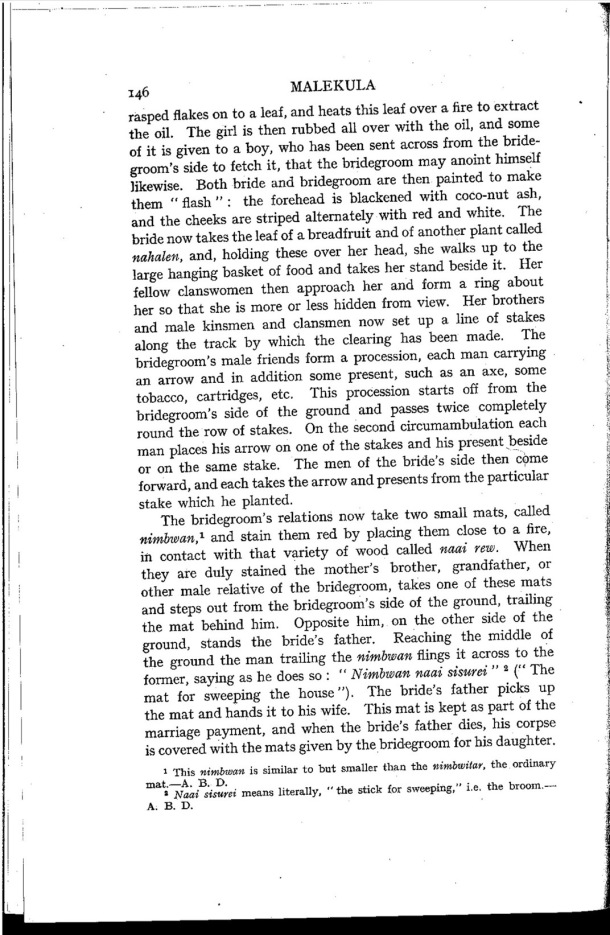|
|  [Note: this transcription was produced by an automatic OCR engine]
14,6 MALEKULA
rasped flakes on to a leaf, and heats this leaf over a fire to extract
the oil. The girl is then rubbed all over with the oil, and some
of it is given to a boy, who has been sent across from the bride-
groom’s side to fetch it, that the bridegroom may anoint himself
likewise. Both bride and bridegroom are then painted to make
them " flash "1 the forehead is blackened with coco-nut ash,
and the cheeks are striped alternately with red and white. The
bride now takes the leaf of a breadfruit and of another plant called
mzhalen, and, holding these over her head, she walks up to the
large hanging basket of food and takes her stand beside it. Her
fellow clanswomen then approach her and form a ring about
her so that she is more or less hidden from view. Her brothers
and male kinsmen and clansmen now set up a line of stakes
along the track by which the clearing has been made. The
bridegroom's male friends fonn a procession, each man carrying
an arrow and in addition some present, such as an axe, some
tobacco, cartridges, etc. This procession starts off from the
bridegroom’s side of the ground and passes twice completely
round the row of stakes. On the second circumambulation each
man places his arrow on one of the stakes and his present _b_eside
or on the same stake. The men of the bride’s side then come
forward, and each takes the arrow and presents from the particular
stake which he planted.
The bridegroom’s relations now take two small mats, called
nimbwanfl and stain them red by placing them close to a ï¬Åre,
in contact with that variety of wood called Mai raw. When
they are duly stained the mother's brother, grandfather, or
other male relative of the bridegroom, takes one of these mats
and steps out from the bridegroom’s side of the ground, trailing
the mat behind him. Opposite him, on the other side of the
ground, stands the bride's father. Reaching the middle of
the ground the man trailing the nimbwan ï¬Åings it across to the
former, saying as he does so : “ Nimbwom naai sismei " 1 (“ The
mat for sweeping the house “). The bride’s father picks up
the mat and hands it to his wife. This mat is kept as part of the
marriage payment, and when the bride's father dies, his corpse
is covered with the mats given by the bridegroom for his daughter.
‘ This mmbwan is similar to but smaller than the nimbwitar, the ordinary
ma.c.—A. B, D.
' Nani siswei means literally, "the stick for sweeping," i.e, the bro0m.——
A. B. D. -
2
n
E
é
ii
i?>£‘i'¢-I».-so<_1_|1/a»-'<<—-f _4e.,.._-Mt..- .
|